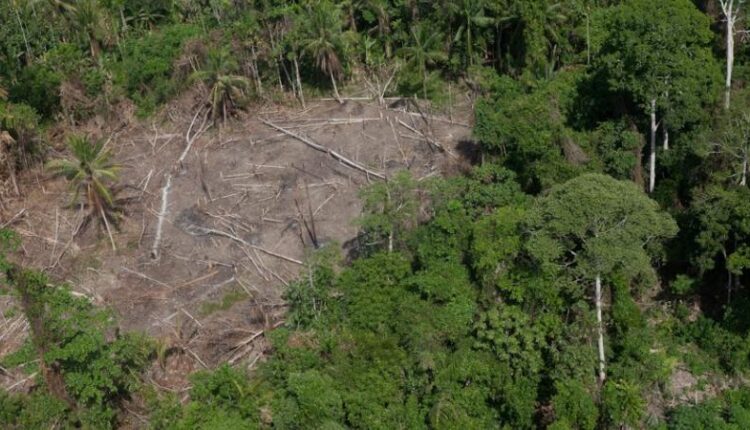Deforestation Still At Record High 4 Years After Cocoa & Forests Initiative
Mighty Earth, EcoCare Ghana call for immediate transparent action
A new study by environment rights group Mighty Earth and its global partners claims cocoa production is still driving the destruction of forests in Ghana and Côte d’Ivoire.
The alarming findings from the world’s top two cocoa-producing nations come almost half a decade after the launch of the key Cocoa & Forests Initiative (CFI) by industry and governments to stem deforestation.
The Cocoa & Forests Initiative is a commitment of top cocoa-producing countries with leading chocolate and cocoa companies to end deforestation and restore forest areas, through no further conversion of any forest land for cocoa production.
Madrid, Seoul or Chicago-sized forest lost
According to a new data analysis by Mighty Earth in the study dubbed ‘Sweet Nothings’, Côte d’Ivoire and Ghana have since the 2019 publication of action plans lost 19,421 hectares and 39,497 hectares of forests in their cocoa-growing regions, respectively.
The global advocacy organisation likened the extent of forest cover lost over the four and half years of CFI as amounting “to a combined area equivalent to the size of the cities of Madrid, Seoul or Chicago.”
“This report unwraps the unsavoury side of the cocoa industry and shows the urgent need to break the link between chocolate products and deforestation,” said Glenn Hurowitz, Chief Executive Officer of Mighty Earth.
“Chocolate companies like Nestlé, Hershey’s, Mondelez and Mars need to stop making empty promises and start working together with governments in the CFI to establish an open and effective joint deforestation monitoring mechanism this year,” he added.
Among the key findings of the report are a failure by the CFI parties to halt deforestation, ongoing deforestation activities in protected areas in both Ghana and Côte d’Ivoire and also evidence that cocoa expansion is playing a major role in this encroachment.
Roadblocks to progress
“All of this devastation is entirely preventable and should have been addressed long ago. Meanwhile, forests continue to disappear, endangered species die, and communities suffer,” said Souleymane Fofana, General Coordinator of the Ivorian Human Rights Organisations (RAIDH).
“The cocoa industry has the same tools and far more resources than Mighty Earth to track and prevent deforestation, but limited willpower and lack of transparency and accountability continue to be the biggest roadblocks to progress,” Fofana observed.
Launching the new study in Accra, Ghana, the Managing Campaigner of EcoCare Ghana, Obed Owusu-Addai, noted that “the Cocoa & Forests Initiative has lots of potential but currently is not living up to it.”
“It promised so much but is failing to deliver. Cocoa and chocolate companies have a duty to protect the environment or risk losing the commodity they depend on forever because the current situation is unsustainable,” Owusu-Addai regretted.
Missing the CFI Commitments
The Cocoa & Forest Initiative frameworks are hinged around three critical themes, namely; forest protection and restoration, sustainable production and farmers’ livelihoods, and community engagement and social inclusion.
A CFI document on Nestle’s website said, “the first priority is the protection and restoration of forests that have been degraded. To this end, the governments and companies have pledged no further conversion of forest land for cocoa production, and have committed to the phased elimination of illegal cocoa production and sourcing in protected areas.”
The EcoCare Ghana advocacy lead, Obed Owusu-Addai, accused the parties to the Cocoa & Forests Initiative of missing the focus of the commitments of that important international framework.
“Just last year the 2nd progress report on the CFI was launched by IDH and WCF. The content pointed to one thing: reforestation. But if you read the commitments, it was about reforestation. It is about preventing deforestation,” Owusu-Addai stressed.
Situating ‘Sweet Nothings’ in the local context
According to ECoCare Ghana, activities in four forest reserves in Ghana were analysed for the report; the Sui Forest Reserve in the Sefwi Wiawso forest district, Krokosua Forest Reserve in Juaboso forest district, the Suhuma Forest Reserve in the Sefwi Wiawso forest district and the Bia National Park.
“When you go to the report, you realise that in the case of Bia it wasn’t as high as in Krokosua, Sui and Suhuma, because Krokosua, [for example], has about 38 admitted farms with two admitted communities,” the EcoCare boss stated.
This, he said, makes human and agricultural activities more pronounced in that reserve, though admitting cocoa “is not solely responsible”.
A recent World Resources Institute (WRI) report pointed to mining as among the major causes of deforestation in Ghana.
“When the original draft of this report was presented to me, I did point to them that when you take Suhuma Forest Reserve, there are about seven [timber logging] concessions in there,” Owusu-Addai explained.
Transparency recommended
This to him makes the case for transparency by chocolate companies and the government extremely relevant, as strongly recommended by Mighty Earth’s ‘Sweet Nothings’ report:
“Chocolate companies, cocoa traders, and governments must pool information about cocoa supply chains, and couple this with the satellite data imagery to establish an open and transparent joint deforestation monitoring mechanism in 2022.”
The environment advocacy partners believe, “such a mechanism would provide the means for collective action to prevent forest encroachment from cocoa expansion, as well as to target initiatives aimed at improving livelihoods for smallholder farmers in Ghana and Côte d’Ivoire.”
Also among the report’s 6-pointer recommendations, the governments of Côte d’Ivoire and Ghana have been challenged to work to quickly confirm the boundaries of protected areas.
It urged authorities to take urgent steps to stop new deforestation by involving, in a transparent manner, communities and civil society organisations in their monitoring.
- Illegal Mining Threatening Ghana’s $230M Cocoa Rehabilitation - April 10, 2024
- Ghana Raises Cocoa Farmgate Price by 58.26% to GHC2,070 per bag - April 5, 2024
- New Standard for Measuring Cocoa Household Income Launched - April 5, 2024
